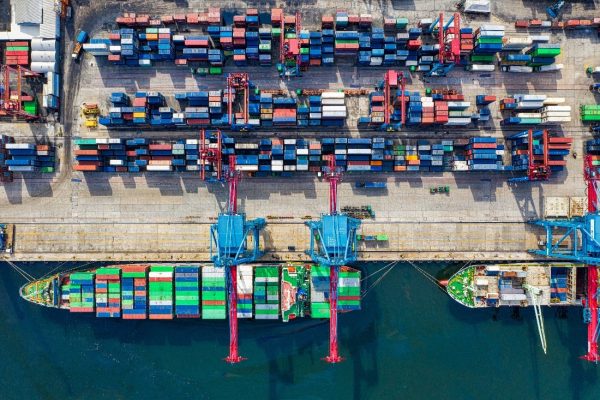
Managing supply chains nowadays is extraordinarily complicated as stakeholders have to maintain paper-based trails. Depending on the type of product, the supply chain covers hundreds of stages, various geographical locations, multiple stakeholders and entities and a multitude of payments and invoices.
Due to the lack of transparency across supply chains, the blockchain presents an opportunity to transform the supply chain and logistics industry.
To understand how blockchain can transform the supply chain, let’s look at the challenges in the supply chain, how the unique features of blockchain could help and examples of real blockchain applications impacting supply chains.

Challenges in the Supply Chain and Logistics Industry
If we go a hundred years back, the supply chain did not seem complicated because commerce used to take place on a small scale and was therefore simple.
Now, businesses have widened globally, making the supply chain management complex. It is not possible for the consumers to know the actual worth of the product due to the lack of transparency in the ecosystem.
Have you ever imagined where the food you eat originates from? Let’s consider the case of the food supply chain.
The supply chain in the food industry is defined by connecting:
- Crop Origination
- Food Processing at Refineries
- Distribution of processed food to retailers
- Selling of Food Items to Consumers
Because the food supply chain comprises millions of people worldwide along with tons of food crops and raw materials, it becomes difficult for both food manufacturers and consumers to know where the different components of the food item belong to.
The issues persist in the supply chain because of the following reasons:
- Lack of Traceability
Traceability represents an exact picture of where the products are within the circulating supply chain at a specific time. Currently, every member within the supply chain network manages their own system and databases, making it complicated to do predictive monitoring and analyze where the product was at a particular time.
- Documentation and Regulatory Compliance
The supply chain’s contracts can be quite complex due to the involvement of paper-based trails for the change of ownership, letters of credit, bills of lading, pro-for-mas and complicated payment terms. Maintaining the records on the paper is cumbersome as it becomes challenging to find the old records.
- Counterfeits
Due to the lack of transparency, various counterfeits cases in the supply chain process are reported every year. According to the organization for Economic Cooperation and Development, pirated and counterfeit imports cost around half-trillion dollars per year in the global economy.
The counterfeited products not only affect the economy, but it could affect lives as well. Due to the lack of available information about the origin and all stages of the project, products hardly meet the quality standards.
- High Costs
Presently, supply chain management involves multiple intermediaries such as lawyers and regulators; it adds extra high costs to the ecosystem. The supply chain process requires middlemen to bring trust to the system. 
How does Blockchain affect Supply Chain?
Before we make you understand how Blockchain is used in logistics, let’s first discuss what blockchain is.
Remember that the blockchain’s use is not restricted to a cryptocurrency like Bitcoin. In reality, the blockchain is a distributed digital ledger that keeps the log of all transactions occurring on the network in a transparent, yet secure way. It can be used for many applications that include the exchange of information, tracking, contracts/agreements, and payment.
Each transaction on the block and multiple copies of the ledger are distributed over nodes in the network, maintaining transparency. Since each block is linked to a block before and after it, the blockchain offers high security. Changing one block would lead to the change in all blocks on the network, making it difficult for hackers to corrupt the blockchain ledger.
Therefore, blockchain can enhance the efficiency and transparency of supply chains and impact everything from the warehouse to delivery and payment.
Every time a product changes hands within the supply chain, the transaction corresponding to it can be documented with timestamps, thereby maintaining a complete history of the product from manufacturing to sale. As a result, time delays, human errors and added costs could be reduced that affect the supply chains today.
Here’s how blockchain can have an impact on the supply chain process:
- Recording the quantity and transfer of products as they change hands between supply chain nodes.
- Tracking change orders, buy orders, shipment notifications, trade documents and receipts from the blockchain ledger.
- Linking physical products to bar codes, RFID or serial numbers and storing them on the blockchain.
- Sharing information about processing or manufacturing process, delivery, assembly and maintenance of products with vendors and suppliers transparently on the blockchain.
By implementing blockchain in the supply chain, you will be able to know who you are dealing with, where the product has been sourced from, who processed or manufactured it and if the payment is fair or not.
Benefits offered by the implementation of Blockchain in Supply Chain
- Provenance Tracking:
Many multinational companies and big organizations do not even have backstories of their products in the supply chain because of no traceability. It may result in high costs and customer relations issues, affecting the brand’s reputation.
Using a blockchain supply chain solution, data sharing, provenance tracking, and record-keeping become more effective and simpler. Since the transactions saved on the blockchain ledger can neither be removed or altered, both consumers and stakeholders can trace the history of any product from its origin through the last mile.
- Cost Reduction:
As blockchain allows real-time tracking of a product within the supply chain without the involvement of intermediaries, the cost of moving items can be reduced.
Removing middlemen from the process prevents extra costs, counterfeits or frauds and reduces the chances of product duplicacy. Instead of depending on financial intermediaries like banks, payments can be processed directly between the parties of the supply chain with crypto payments.
- Increased transparency:
Blockchain’s immutable ledger prevents information tampering and allows suppliers and retailers to view the point of origin for each order. Enhanced visibility also implies that manufacturers can verify the inventory to combat counterfeit trade.
- Trust Building:
Parties involved in the supply chain need to trust each other to maintain the credibility and authenticity of a product. A blockchain-based supply chain solution brings trust in the system with time-stamped records saved at all times, enabling each stakeholder to access any previous or current record.

Blockchain Supply Chain Use Cases
- Oil Supply Chain
UAE’s state-owned oil company, Abu Dhabi National Oil Company (ADNOC), has launched a supply chain system pilot program on the blockchain. It aims to track oil from the oil well to customers while automating transactions simultaneously.
They have planned to expand the chain by including investors and customers, bringing more transparency to the process.
ADNOC produces approximately 3 million barrels of oil every day. Implementing blockchain technology will allow everyone to track oil produced, thereby reducing costs and time associated with the shipment.
- Food Safety
Since it is complicated to know the origin of an outbreak, retailers have to throw out the inventories of produce forcefully. Companies including Walmart, JD.com and Tsinghua University are working together to enhance food transparency and shipment efficiency with blockchain technology.
Tsinghua University manages the research and maintains the blockchain development while Walmart and JD.com manage production and shipment of products. The aim is to offer food safety by allowing manufacturers, processors, and retailers to track the end-to-end shipment of food products to improve the recall process and reduce counterfeits.
- Diamond Tracking
Conflict or blood diamonds are mined under unsuitable and violent conditions and produced heavily in Africa. Sales of such diamonds are often used to fund conflicts in the region.
De Beers is one of the world’s largest diamond producers that has taken initiatives to end the sale of blood diamonds with blockchain supply chain solutions.
With their project Tracr, De Beers could track 100 diamonds from the diamond mine to cutter, polisher, and jeweler. Photos related to the diamond’s progress can be uploaded to the blockchain that includes quality, location, and color.

- Wine Supplies with a Blockchain Logistics Tool
According to the Interprofessional Council of Bordeaux Wine, around 30,000 illegitimate bottles of wines are sold every hour in China. Wines are adulterated with a variety of harmful additives that can be detrimental to health.
Original, in collaboration with TagltSmart, conducted the pilot program that tracked over 15,000 wine bottles. The goal is to put an end to illegitimate wine with blockchain’s capabilities to offer transparency.
Consumers can know details related to the purchase of each bottle by scanning a QR code on it.
- Pharma Supply Chain
The Blockchain solution allows the UNO to track the distribution of free drugs from the warehouse through the last mile and identify losses and inefficiencies.

Conclusion:
The blockchain technology has the potential to reconstruct the supply chain and transform the way we produce, promote, buy and consume the goods. Transparency, security, and traceability offered by the blockchain can make our economies safer and reliable and promote trust and honesty. Get in touch with a team of blockchain experts today to add value to your product’s supply chain and enhance the brand’s reputation.




